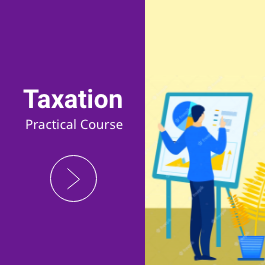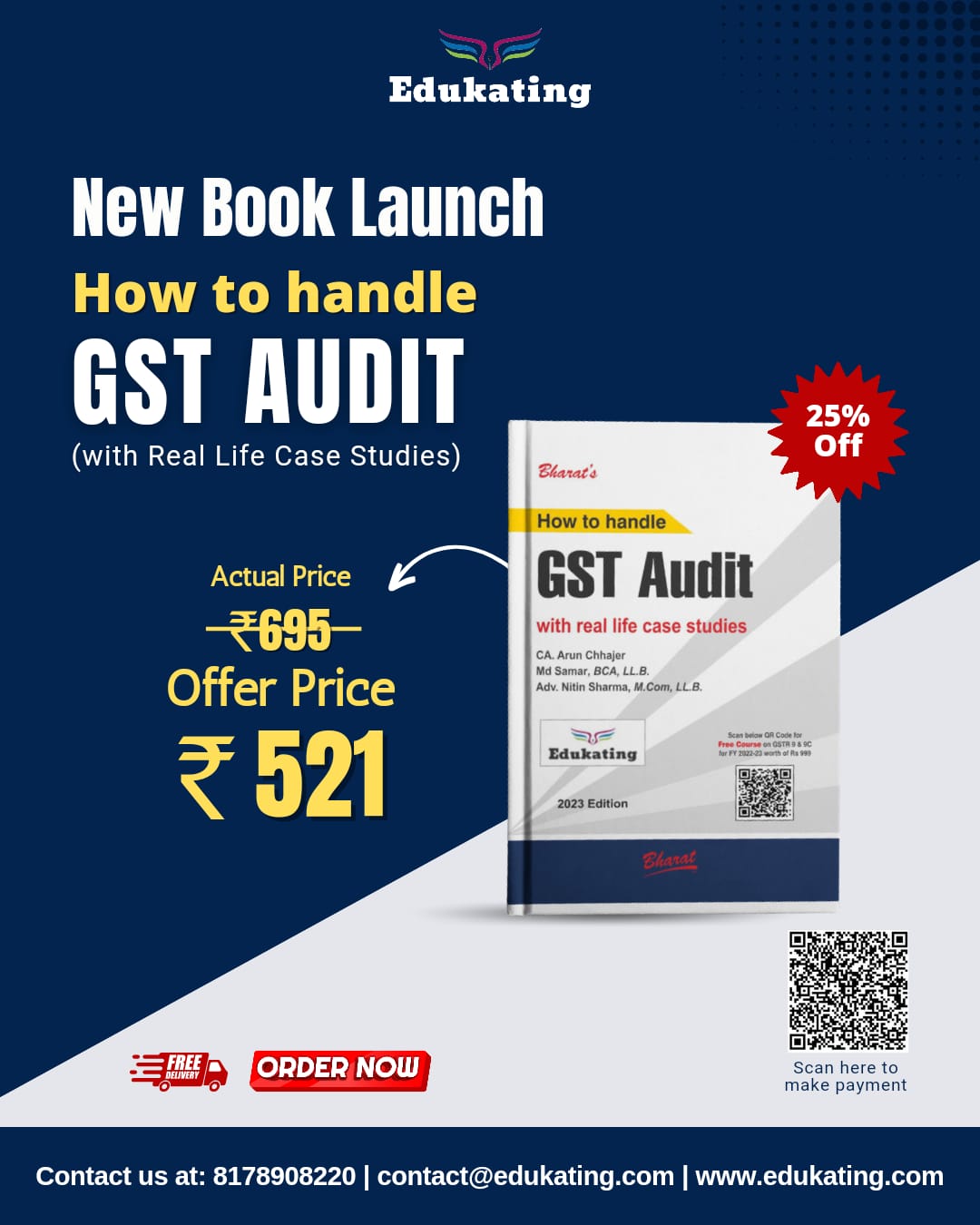ALL ABOUT INSPECTION, SEARCH AND SEIZURE
Topics Covered
- Difference between Inspection and Search
- Provisions regarding initiation of Inspection
- Provisions regarding initiation of Search and Seizure
- Release of Goods Seized
DIFFERENCE BETWEEN INSPECTION AND SEARCH
| REASON | INSPECTION | SEARCH |
| MEANING | It is a softer provision than search which enables officers to access any place of business of a taxable person or of a person engaged in transporting goods or who is an owner or an operator of a warehouse or godown. | Denotes an action of a government machinery to go, look through or examine carefully a place area, person, object etc in order to find something concealed or for the purpose of discovering evidence of a crime. |
Provisions regarding initiation of Inspection
As per Section 67(1) of CGST Act 2017 Where the proper officer, not below the rank of Joint Commissioner, has REASONS TO BELIEVE that
NOTE - REASONS TO BELIEVE is not defined anywhere in GST Law
(a) a taxable person has suppressed any transaction relating to supply of goods or services or both or the stock of goods in hand, or has claimed input tax credit in excess of his entitlement under this Act or has indulged in contravention of any of the provisions of this Act or the rules made thereunder to evade tax under this Act; or
(b) any person engaged in the business of transporting goods or an owner or operator of a warehouse or a godown or any other place is keeping goods which have escaped payment of tax or has kept his accounts or goods in such a manner as is likely to cause evasion of tax payable under this Act, he may authorize in writing any other officer of central tax to inspect any places of business of the taxable person or the persons engaged in the business of transporting goods or the owner or the operator of warehouse or godown or any other place.
As per Rule 139 (1) of CGST Rules 2017
Where the proper officer not below the rank of a Joint Commissioner has reasons to believe that a place of business or any other place is to be visited for the purposes of inspection or search or, as the case may be, seizure in accordance with the provisions of section 67, he shall issue an authorization in FORM GST INS-01 authorizing any other officer subordinate to him to conduct the inspection or search or, as the case may be, seizure of goods, documents, books or things liable to confiscation.
As per CBIC Guidelines
A Joint Commissioner or an officer higher in rank can give such authorization only if he has reasons to believe that person concerned has done one of the following actions:
- Suppression of any transaction relating to supply of goods or services or stock in hand.
- Claimed excess input tax credit.
- Contravention of any provisions of the Act or the Rules to evade tax.
- Transporting or keeping goods which escaped payment of tax or manipulating accounts or stocks which may cause evasion of tax
Inspection can also be done of the conveyance, carrying a consignment of value exceeding specified limit. The person in charge of the conveyance has to produce documents/devices for verification and allow inspection. Inspection during transit can be done even without authorization of Joint Commissioner.
INSPECTION IN MOVEMENT
(a) Any consignment, value of which, is exceeding Rs. 50,000/-, may be stopped at any place for verification of the documents/ devices prescribed for movement of such consignments.
(b) If on verification of the consignment, during transit, it is found that the goods were removed without prescribed document or the same are being supplied in contravention of any provisions of the Act then the same can be detained or seized and may be subjected to penalties as prescribed.
(c) To ensure transparency and minimize hardships to the trade, the law provides that if during verification, in transit, a consignment is held up beyond 30 minutes the transporter can feed details on the portal. This will ensure accountability and transparency for all such verifications. Moreover, for verification during movement of consignment will also be done through a Digital interface and therefore the physical intervention will be minimum and as has already been mentioned that in case of a delay beyond 30 minutes the transporter can feed the details on the portal.
Provisions regarding initiation of Search and Seizure
As per Section 67(2) of CGST Act 2017
Where the proper officer, not below the rank of Joint Commissioner, either pursuant to an inspection carried out under sub-section (1) or otherwise, has reasons to believe that any goods liable to confiscation or any documents or books or things, which in his opinion shall be useful for or relevant to any proceedings under this Act, are secreted in any place, he may authorize in writing any other officer of central tax to search and seize or may himself search and seize such goods, documents or books or things:
Provided that where it is not practicable to seize any such goods, the proper officer, or any officer authorized by him, may serve on the owner or the custodian of the goods an order that he shall not remove, part with, or otherwise deal with the goods except with the previous permission of such officer:
Provided further that the documents or books or things so seized shall be retained by such officer only for so long as may be necessary for their examination and for any inquiry or proceedings under this Act.
(3) The documents, books or things referred to in sub-section (2) or any other documents, books or things produced by a taxable person or any other person, which have not been relied upon for the issue of notice under this Act or the rules made thereunder, shall be returned to such person within a period not exceeding thirty days of the issue of the said notice.
As per Rule 139(2) of CGST Rules2017,
Where any goods, documents, books, or things are liable for seizure under sub-section (2) of section 67, the proper officer or an authorized officer shall make an order of seizure in FORM GST INS-02.
As per CBIC Guidelines
The provisions of search and seizure also provide enough safeguards and the GST Law stipulates that search of any place of business etc. can be carried out only under authorization from an officer not below the rank of Joint Commissioner and if he has a reason to believe that the person concerned has done at least one of the following:
(a) Goods liable to confiscation or any documents/ books/ record/ things, which may be useful for or relevant to any proceedings, are secreted in any place then all such places can be searched
(b) All such goods/documents/books/records/ things may be seized; however, if it is not practicable to seize any such goods then the same may be detained. The person from whom these are seized shall be entitled to make copies/extracts of seized records
(c) The seized documents/books/things shall be retained only till the time the same are required for examination/inquiry/ proceedings and if these are not relied on for the case then the same shall be returned within 30 days from the issuance of show cause notice
(d) The seized goods shall be provisionally released on execution of the bond and furnishing security or on payment of applicable tax, interest, and penalty
(e) In case of seizure of goods, a notice has to be issued within six months; if no notice is issued within a period of six months then all such goods shall be returned. However, this period of six months can be extended by Commissioner for another six months on sufficient cause.
(f) An inventory of the seized goods/documents/ records is required to be made by the officer and the person, from whom the same are seized, shall be given a copy of the same.
(g) To ensure that the provisions for search and seizure are implemented in a proper and transparent manner, the Act stipulates that the searches and seizures shall be carried out in accordance with the provisions of the Criminal Procedure Code, 1973. It ensures that any search or seizure should be made in the presence of two or more independent witnesses; a record of entire proceedings is made and forwarded to the Commissioner forthwith.
Release of Goods Seized
Sub section (6) of section 67 provides for the release of goods on a provisional basis subject to execution of bond and furnishing of security. Section 67(6) states
The goods so seized under sub-section (2) shall be released, on a provisional basis, upon execution of a bond and furnishing of security, in such manner and of such quantum, respectively, as may be prescribed or on payment of applicable tax, interest, and penalty payable, as the case may be.
Sub – section (7) of section 67 provides for a release of goods where if no notice in respect thereof is given within six months of the seizure of the goods then such goods shall be released to the person from where possession they were seized. Section 67(7) states
Where any goods are seized under sub-section (2) and no notice in respect thereof is given within six months of the seizure of the goods, the goods shall be returned to the person from whose possession they were seized:
Provided that the period of six months may, on sufficient cause being shown, be extended by the proper officer for a further period not exceeding six months.
As per Rule 140 of CGST Rules 2017
(1) The seized goods may be released on a provisional basis upon execution of a bond for the value of the goods in FORM GST INS-04 and furnishing of a security in the form of a bank guarantee equivalent to the amount of applicable tax, interest, and penalty payable.
Explanation.- For the purposes of the rules under the provisions of this Chapter, the applicable tax shall include central tax and State tax or central tax and the Union territory tax, as the case may be, and the cess, if any, payable under the Goods and Services Tax (Compensation to States) Act, 2017 (15 of 2017).
(2) In case the person to whom the goods were released provisionally fails to produce the goods at the appointed date and place indicated by the proper officer, the security shall be encashed and adjusted against the tax, interest, and penalty, and fine, if any, payable in respect of such goods.
AUTHOR VIEW
As per departmental view, Inspection is not being done only Search is being taken place because it’s a very harsh provision to be conducted by the department. The CGST Law provides special powers to Commissioner which results in used against taxpayers. These powers should be used to penalize the taxpayers with malaifide intention but not to harass the genuine taxpayers.
DISCLAIMER
The views expressed in this article are those of the individual author’s writing in his individual capability only. The information provided in this article does not intend to constitute legal advice, instead all the information, content, and materials available in this article are for general purpose only. Readers of this article should contact their attorney to obtain advice with respect to any particular legal matter.























































